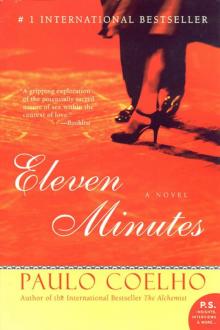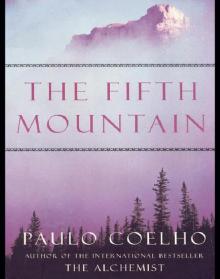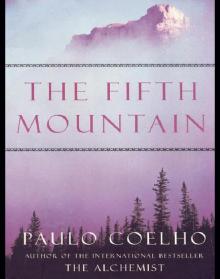- Home
- Paulo Coelho
The Book of Manuals Page 3
The Book of Manuals Read online
Page 3
8. Don’t try to see the world in a month. It is far better to stay in a city for four or five days than to visit five cities in a week. A city is like a capricious woman: she takes time to be seduced and to reveal herself completely.
9. A journey is an adventure. Henry Miller used to say that it is far more important to discover a church that no one else has ever heard of than to go to Rome and feel obliged to visit the Sistine Chapel with two hundred thousand other tourists bellowing in your ear. By all means go to the Sistine Chapel, but wander the streets too, explore alleyways, experience the freedom of looking for something - quite what you don’t know - but which, if you find it, will - you can be sure - change your life.
The ten steps of the spiritual search according to the Tradition
1. Restlessness: You realise that you need to change your life, either because it’s boring or because it’s painful.
2. The search: The decision to change. The search begins through books, courses, meetings.
3. Disappointment: Looking for the right path. You become aware of your teachers’ problems and faults. However many strands of philosophy or religion you follow, however many secret societies you join, there are always the same underlying problems: vanity and a desire for power.
4. Denial: Many people abandon the path when they realise that those who are on the path have not yet resolved their own problems.
5. Anxiety: You abandon the path, but a seed has been sown: faith. And it grows day and night. You feel uncomfortable, believing that you found something and then lost it.
6. The return: Some other serious rupture (a tragedy or an ecstasy perhaps) makes you realise that your faith is still alive. And faith, if tended with care, resists all disappointments.
7. The teacher: The most dangerous moment. Teachers are merely people with experience. Each path is different and individual, but, at this point, it risks being sullied and becoming a collective path.
8. The signs: You leave your teacher when the path reveals itself – through signs. Through those signs, God is teaching you what you need to know.
9. Dark night: You have made your choice. You change your life and take your first steps – despite your fear.
10. Communion: This is the moment when, as St Paul, said, the Divinity enters the person. The mystery of miracles reveals itself in all its marvellous grandeur.
Manual for dealing with time
(the following text is based on studies carried out by a friend of mine, Stephan Rechtstaffen, a doctor who set up the highly successful Omega Institute in New York)
1. Time is not a measure, but a quality. When we look back at the past, we are not rewinding a tape, but recalling the gift of our existence on this earth. You cannot measure time the way you measure a road, because we are always taking gigantic leaps backwards (memories) and forwards (plans).
2. Managing time is not living: The idea that time is money is pure nonsense. We should be conscious of every minute, knowing how to take full advantage of it by doing what we are doing (with love) or simply by contemplating life. The day is made up of twenty-four hours and many, many moments. If we slow down, everything lasts longer. It might take longer to wash the dishes, but why not use that time to think about nice things, to sing, relax, and take pleasure in being alive?
3. In harmony with life: Artur Rubinstein, one of the greatest pianists of the twentieth century, was once asked by an ardent admirer: ‘How do you handle the notes as well as you do?’ Rubinstein answered: ‘I handle the notes no better than many others, but the pauses – ah! that is where art resides.’ Stephan’s divorce was very painful, and he thought that by keeping busy, he would get through the difficult times. It didn’t work, the pain was still there. After a while, he started to ‘use the pauses’ – to sit down and allow the pain to enter him and touch him and then pass. Little by little, he began to rebuild his life, gaining a better understanding of the reasons behind the separation, and now his ex-wife works with him at the Omega Institute – because he was able to face up to the pain and not just hide it away behind a multitude of different tasks.
4. Experiencing things more deeply: A study of visitors to Washington’s National Zoo showed that, on average, people never spend more than about ten seconds looking at any group of animals. Why go to the zoo, then? Wouldn’t you be better off looking at an illustrated book? People complain that the hippos are always under water; in fact, the average time hippos spend under water varies between 90 seconds and a maximum of five minutes – the visitors are in such a hurry to move on that they miss what they came to see.
5. Knowing when to think and when to act: a seriously obese patient of Stephan’s said that she was prepared to do anything to lose weight. He suggested that whenever she felt like eating, she should observe the feeling, but not act. ‘But I’m hungry!’ she said. ‘Exactly! If you can live with that feeling, observe the hunger, allowing yourself to feel it in all its intensity – but not act – soon the urge will diminish, and you will learn to be the mistress of your will and not the slave of your impulses.’
6. Don’t remain passive in the face of negative emotions: When we sit down on a sofa and turn on the TV, we are, in fact, turning off from the world. Or else we start to feel anxious, thinking that we’re wasting time, that we should be phoning someone, working out, tidying the house. Why? Because when we sit still, a whole wave of repressed emotions washes over us, depressing us and leaving us feeling sad and guilty. The busier we are, the more those emotions will accumulate, with the risk that, one day, they will explode.
Yes, we all have problems that we need to face, so why not do it now? Stop. Think. Even suffer a little. In the end, we might understand who we are, what we are feeling, what we are doing here, in this moment, rather than being ruled by the Diary of Life.
The warrior of life and renunciation
1. Renouncing what you have. This is Mahatma Gandhi’s strategy, to which the warrior of light listens with respect, ignoring those people who, incapable of achieving anything, nevertheless preach renunciation:
‘When engaged in any activity, one must know what to expect, by what means we will reach our goal, and how capable we are of doing the task in hand.’
‘Only someone who has no desire for the results of conquest and remains absorbed in the combat itself can claim to have renounced the fruits.’
‘You can renounce the fruit, but that does not mean you are indifferent to the result.’
2. Renouncing vengeance. The warrior of light has the sword in his hands.
He is the one who decides what he will do and what he will never do.
There are moments when life leads him into a crisis; he is separated from things he has always loved; it is then that the warrior reflects. He checks that he is fulfilling God's will or if he is merely acting selfishly. If this separation is really part of his path, then he accepts without complaint.
If, however, such a separation was provoked by someone else’s perverse actions, then he is implacable in his response.
The warrior possesses both force and forgiveness. He can use both with equal skill.
3. Renouncing provocation. The experienced fighter puts up with insults; he knows the strength of his fist and the skill of his blows. Confronted by an unprepared opponent, he looks deep into his eyes and conquers him without ever having to resort to a physical fight.
As the warrior learns from his spiritual master, the light of faith shines in his eyes and he does not need to prove anything to anyone. He is not bothered by his opponent's aggressive arguments which say that God is a superstition, that miracles are just tricks, that believing in angels is running away from reality.
Like the fighter, the warrior of light is aware of his own immense strength; he never fights with anyone who does not deserve the honour of combat.
4. Renouncing time. The warrior of light listens to Lao Tzu when he says that we should let go of the idea of days and hours in order to pay more attention to the moment.
Only in this way can he resolve certain problems before they occur; by focusing on the small things, he manages to avoid larger calamities.
But thinking about the small things is not the same as thinking small. Over-anxiety ultimately banishes every trace of joy from life.
The warrior knows that a great dream is made up of many different things, just as the light from the sun is the sum of its millions of rays.
5. Renouncing comfort. The warrior of light studies the two pillars on either side of the door he is trying to open.
One is called Fear and the other is called Desire. The warrior looks at the pillar of Fear and on it is written: ‘You are entering a dangerous, unfamiliar world where everything you have learned up until now will prove useless.’
The warrior looks at the pillar of Desire and on it is written: ‘You are about to leave a familiar world wherein are stored all the things you ever wanted and for which you struggled long and hard.’
The warrior smiles because nothing frightens him and nothing holds him. With the confidence of one who knows what he wants, he opens the door.
Carlos Castañeda and the sacred lineage
(A selection based on texts by Carlos Castañeda, 1925-1998))
1. Behaviour. A man goes to knowledge as he goes to war: with fear, respect and absolute assurance. He should behave as if he knew where he was going, although, in fact, he has no idea what he will find; what matters is that he is following the path he chose.
2. Nothing to lose. A warrior considers that he is already dead. Since he has nothing to lose, he proceeds calmly and with heart. Fear no longer drains his energy, and he can apply that energy to living each moment as intensely as possible. The warrior is sure that he has in his hands all the tools he needs to face future difficulties, and it is the use of those tools, also known as experience, that will allow him to overcome obstacles.
3. Acting and knowing. A warrior is always a hunter. He thinks everything through and only acts after reflecting carefully on what he should do. No one can force him to do things he doesn’t want to do. He lives because he acts, and not because he thinks he is acting. Knowing that he will be in this world for only a brief period, he tries to experience all the world’s marvels. He speaks little, never thinks about fear, and takes responsibility for his actions.
4. Death as companion. A warrior-hunter knows that each decision could be his last. Death is his companion, always seated at his left side, at least a metre away. That is why he goes to the battlefield totally focussed on his life, knowing that most people go from action to action without really thinking about it.
5. All paths are the same. All paths are the same and lead nowhere. Therefore, the warrior chooses a path that has a life of its own, and from the moment he begins to follow that path, he feels glad and becomes the path. His decision to continue along it depends entirely on his happiness, not on his ambition or his fear. However, before he acts, he always asks himself: ‘Does this path have heart?’
6. Other people’s opinions. A warrior doesn’t waste precious time worrying about what other people think. He knows people who think they are important, and who, because of that, are fat, arrogant and unbending. For a warrior, the art of combat must be combined with lightness and a lack of tension and ambition. A warrior is kind to other people because, above all, he is kind to himself.
7. Intention. A man’s intention is not a thought or an object or a desire, but what makes him go forwards even when everyone is telling him he will be defeated or that his chosen course of action makes no sense. Having a clear intention helps the warrior to be invulnerable, to behave like a shaman, capable of walking through walls and touching the infinite.
8. The choice of path. Nothing in this world is given to us as a gift. The most important lessons are always learned with great effort and difficulty. With this in mind, the warrior-hunter never despairs or wastes his time blaming others, because he knows that whatever he does, he bears sole responsibility for his choices. A warrior cannot complain or have regrets: his life is a constant struggle, and the challenges he meets are neither good nor bad, they are merely challenges.
Manual for being accepted in society as a normal person
1. Accept anything that makes us forget our true identity and our dreams and obliges us to work solely in order to produce and reproduce.
2. Accept that it is possible to draw up rules for a war (the Geneva Convention).
3. Spend years studying at university and then fail to find a job.
4. Work from nine to five on something that gives you no pleasure, so that in thirty years’ time you can retire.
5. Retire, discover that you no longer have enough energy to enjoy life, and die after only a few years – of boredom.
6. Use botox.
7. Try to be financially successful rather than go looking for happiness.
8. Ridicule people who look for happiness rather than money, saying that he or she ‘lacks ambition’.
9. Compare objects such as cars, houses, clothes, and define your life according to those comparisons, instead of trying to find out why you’re alive.
10. Don’t talk to strangers.
11. Always believe that your parents are right.
12. Marry, have children, stay together even when love has died, saying that it’s for the good of the children (who, of course, barely notice the constant rows).
12a. Criticise anyone who tries to be different.
14. Wake up to a hysterical alarm clock every morning.
15. Believe everything you read.
16. Wear a piece of coloured cloth tied around your neck, which serves no obvious function, but which goes by the name of ‘tie’.
17. Never ask direct questions, even if the other person knows what it is you want to know.
18. Keep smiling even when you feel like bursting into tears. And feel sorry for all those who show their feelings.
19. Believe that art is either worth a fortune or worth nothing at all.
20. Always despise anything that was achieved too easily, because it did not involve the necessary sacrifice and therefore lacks the required qualities.
21. Keep up with fashion, even if the clothes are ridiculous and uncomfortable.
22. Believe that all famous people have tons of cash stashed away.
23. Invest time and money in outer beauty and pay scant attention to inner beauty.
24. Do everything you can to show that, although you are a normal person, you are infinitely superior to other human beings.
25. When travelling on public transport, never catch the eye of another passenger, in case he or she thinks you’re flirting.
26. When you get into a lift, stand facing the door and pretend that you’re the only person there, however crowded it is.
27. Never laugh out loud in a restaurant, however funny the joke.
28. In the northern hemisphere, always dress according to the season: bare arms in spring (regardless of how cold it is) and woollen jacket in the autumn (regardless of how warm it is).
29. In the southern hemisphere, deck the tree with fake snow, even though winter has nothing to do with the birth of Christ.
30. As you grow older, believe that you possess all the world’s wisdom, even though you haven’t necessarily lived enough to know what’s right and wrong.
31. Go to a charity tea party and think that you have thereby done enough to abolish social inequality in the world.
32. Eat three times a day, even if you’re not hungry.
33. Believe that everyone else is better than you – better-looking, more capable, richer, more intelligent. It’s very dangerous to go beyond your own limits, best do nothing.
34. Use your car as a way of feeling powerful and master of the universe.
35. Swear at the traffic.
36. Believe that whenever your son does something wrong it’s because of the company he keeps.
37. Marry the first person who offers you a good position in society. Love can wait.
38. Always say ‘I tried’, even when you haven’t tried at all.
39. Postpone experiencing the most interesting things in life until you’re too weak and tired to do so.
40. Fend off depression with long daily doses of television.
41. Believe that it’s possible to be sure of everything you’ve achieved.
42. Believe that women don’t like football and that men don’t like interior design.
43. Blame the government for everything that goes wrong.
44. Believe that being a good, decent, respectful person means that others will think you weak, vulnerable and easily manipulated.
45. Be equally convinced that treating other people rudely and aggressively is synonymous with having a powerful personality.
46. Be afraid of a fibroscopy (men) and childbirth (women).
47. Finally: believe that your religion is the one absolute truth and that anyone else on this vast planet who believes in some other manifestation of God deserves to be condemned to the fires of hell.
Manual for climbing mountains
1. Choose the mountain you want to climb: Don’t be influenced by what other people say: ‘that one’s prettier’ or ‘that one looks easier’.You are going to put a lot of energy and enthusiasm into achieving your objective, and you are the only person responsible for your choice, so be quite sure about what you are doing.
2. Find out how to reach the mountain: Often you can see the mountain in the distance – beautiful, interesting, full of challenges. However, when you try to reach it, what happens? It’s surrounded by roads; forests lie between you and your objective; and what seems clear on the map is far more complicated in reality So you must try all the paths and tracks until, one day, you find yourself before the peak you intend to climb.

 The Alchemist
The Alchemist Maktub
Maktub Like the Flowing River
Like the Flowing River The Winner Stands Alone
The Winner Stands Alone The Spy
The Spy By the River Piedra I Sat Down and Wept: A Novel of Forgiveness
By the River Piedra I Sat Down and Wept: A Novel of Forgiveness Eleven Minutes
Eleven Minutes Manuscript Found in Accra
Manuscript Found in Accra Warrior of the Light
Warrior of the Light Veronika Decides to Die: A Novel of Redemption
Veronika Decides to Die: A Novel of Redemption The Devil and Miss Prym: A Novel of Temptation
The Devil and Miss Prym: A Novel of Temptation The Valkyries: An Encounter With Angels
The Valkyries: An Encounter With Angels Brida: A Novel
Brida: A Novel Fifth Mountain: A Novel
Fifth Mountain: A Novel Adultery
Adultery Inspirations
Inspirations The Archer
The Archer The Witch of Portobello
The Witch of Portobello The Pilgrimage
The Pilgrimage The Zahir
The Zahir Brida
Brida The Fifth Mountain
The Fifth Mountain Like the Flowing River: Thoughts and Reflections
Like the Flowing River: Thoughts and Reflections Manual of the Warrior of Light
Manual of the Warrior of Light By The River Piedra I Sat Down & Wept
By The River Piedra I Sat Down & Wept The Supreme Gift
The Supreme Gift Aleph
Aleph Hippie
Hippie Witch of Portobello
Witch of Portobello The Devil and Miss Prym
The Devil and Miss Prym The Alchemist - 10th Anniversary Edition
The Alchemist - 10th Anniversary Edition The Valkyries
The Valkyries